News & Media
'Securing Our Legacy,' a Plan for DePauw's Future, Outlined by President Bottoms in Campus Address
April 5, 2006
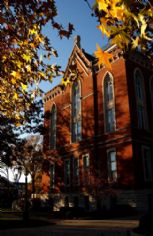 April 5, 2006, Greencastle, Ind. - Over the next five years, DePauw University will strive to further enhance academic engagement and campus life, reach across oceans to build an increasingly diverse student body and faculty while increasing opportunities for DePauw students and professors to study abroad, and engage the University's dedicated alumni in new ways. That was the message President Robert G. Bottoms delivered today in an address to the DePauw community as he outlined "Securing Our Legacy."
April 5, 2006, Greencastle, Ind. - Over the next five years, DePauw University will strive to further enhance academic engagement and campus life, reach across oceans to build an increasingly diverse student body and faculty while increasing opportunities for DePauw students and professors to study abroad, and engage the University's dedicated alumni in new ways. That was the message President Robert G. Bottoms delivered today in an address to the DePauw community as he outlined "Securing Our Legacy."
![]() [Download Audio: "Securing Our Legacy" - 157kb] "The reason it has that name is there's not really anything -- absent perhaps technology -- ... (in the plan) that has not gone on at some level in the University in the past," Dr. Bottoms told members of DePauw's faculty and staff and students who formed a standing room only crowd in the ballroom of the Memorial Student Union Building this morning.
[Download Audio: "Securing Our Legacy" - 157kb] "The reason it has that name is there's not really anything -- absent perhaps technology -- ... (in the plan) that has not gone on at some level in the University in the past," Dr. Bottoms told members of DePauw's faculty and staff and students who formed a standing room only crowd in the ballroom of the Memorial Student Union Building this morning.
The strategic plan has three key objectives:
- To provide an outstanding learning and living environment that encourages academic excellence and the formation of intellectual communities.
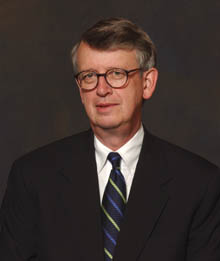
- To prepare students to make a positive difference in the diverse and interconnected world in which they will live and work.
- To cultivate alumni loyalty through lifetime engagement.
President Bottoms reminded his audience that since the 1999-2000 academic year, DePauw's full-time faculty has grown from 150 to 230 -- a 40% increase -- resulting in a faculty-student ratio of one-to-ten and reducing DePauw's average class size to 17. ![]() [Download Audio: "Unprecedented" - 206kb] "I believe, although I haven't studied it carefully, that this would be unprecedented in DePauw's history," Bottoms asserts. "It does place us in the ranks of the top liberal arts colleges in the country."
[Download Audio: "Unprecedented" - 206kb] "I believe, although I haven't studied it carefully, that this would be unprecedented in DePauw's history," Bottoms asserts. "It does place us in the ranks of the top liberal arts colleges in the country."
The president who has led DePauw for twenty years noted how the University's intellectual life has also been enhanced by recent programs such as the week-long symposium, "Political Education and the Modern University," and the annual "DePauw Discourse" weekends.
With the new Richard E. Peeler Art Center and renovated and expanded William Weston Clarke Emison Museum of Art, "We have come a long way in four short years," Bottoms noted, and he sees the arts community at DePauw becoming even more "vibrant" when work on the Judson and Joyce Green Center for the Performing Arts is 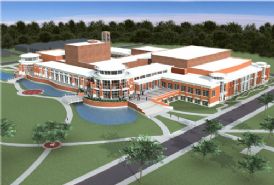 completed.
completed. ![]() [Download Audio: "The Arts" - 508kb] "The importance of the renovation and expansion of the Green Center for the Performing Arts will add, for our music program and our theatre program, the same kind of emphasis we've been able to add to our art program. Soon we will have a facility worthy of the excellence of the School of Music and this will help us in our search for students, I believe," Bottoms asserts. "It ought to be a privilege to come to a place like DePauw and operate in facilities like we will have."
[Download Audio: "The Arts" - 508kb] "The importance of the renovation and expansion of the Green Center for the Performing Arts will add, for our music program and our theatre program, the same kind of emphasis we've been able to add to our art program. Soon we will have a facility worthy of the excellence of the School of Music and this will help us in our search for students, I believe," Bottoms asserts. "It ought to be a privilege to come to a place like DePauw and operate in facilities like we will have."
The ways DePauw has used technology to improve teaching and learning have also impacted the campus. ![]() [Download Audio: "A National Model" - 335kb] "I believe one could make the case, and many people in this room could make it perhaps better than I, that when we think about instructional technology DePauw in some sense has become a national model. Our ITAP program, (including) the internships that we have using technology in classrooms
[Download Audio: "A National Model" - 335kb] "I believe one could make the case, and many people in this room could make it perhaps better than I, that when we think about instructional technology DePauw in some sense has become a national model. Our ITAP program, (including) the internships that we have using technology in classrooms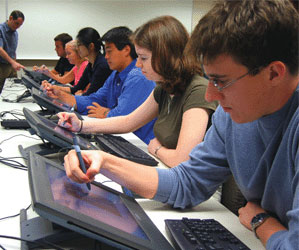 all across the curriculum, is a resource many institutions would envy," Bottoms says. Five years hence, he envisions technology allowing DePauw students who study abroad to teleconference with their professors in Greencastle, and create new opportunities for interaction and engagement.
all across the curriculum, is a resource many institutions would envy," Bottoms says. Five years hence, he envisions technology allowing DePauw students who study abroad to teleconference with their professors in Greencastle, and create new opportunities for interaction and engagement.
In discussing the second strategy -- that DePauw will prepare students will make a positive difference in the increasingly diverse and interconnected world -- Dr. Bottoms recalled that in 1986, when he assumed the presidency, DePauw had 81 multicultural students. "Last year we had 338. That's a growth of 400%," he noted. The president also reported that this year DePauw offered admission to 446 minority students, 124 more than it did last year. Twenty years ago there was one minority member of the DePauw faculty, today there are 43.
![]() [Download Audio: "The Importance of Diversity" - 534kb] "We want a diverse student body and faculty not simply to reflect the diversity of society but because of the way diversity improves the learning environment," Bottoms says. "You've heard me say many times we
[Download Audio: "The Importance of Diversity" - 534kb] "We want a diverse student body and faculty not simply to reflect the diversity of society but because of the way diversity improves the learning environment," Bottoms says. "You've heard me say many times we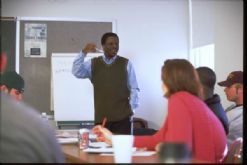 just don't learn many things from people just like ourselves. It's also becoming increasingly true in this society that the better students in our pool -- the better students in high schools we hope to attract and their parents -- and the best faculty in our pool want to come to a school as diverse, or perhaps even more so, than the one I have been describing."
just don't learn many things from people just like ourselves. It's also becoming increasingly true in this society that the better students in our pool -- the better students in high schools we hope to attract and their parents -- and the best faculty in our pool want to come to a school as diverse, or perhaps even more so, than the one I have been describing."
As he discussed during his recent, first-ever webcast, President Bottoms says "We will continue the emphasis on diversity in this country, but we want to expand our definition of diversity to include a global perspective." Today, DePauw has 35 degree seeking students from countries besides America. Securing Our Legacy seeks to increase that to 50 new international students per year, so that 200 will be studying at the University at a given time.
In February, Dr. Bottoms traveled to India for a week and met with students, educators and business leaders and create synergies that could lead to students from that country coming to DePauw to study, and students and faculty members from DePauw learning and teaching in India. ![]() [Download Audio: "Transformative Experiences" - 381kb] "Having spent a week in India
[Download Audio: "Transformative Experiences" - 381kb] "Having spent a week in India 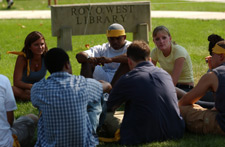 I do not perceive myself to be an expert," Bottoms told his audience this morning. "But I do know and I can imagine that if I spent a semester or a year teaching in some of the institutions I visited that it would have perhaps a transformative effect on the way I viewed the world when I came home, and if I were teaching courses it would certainly have an impact on my subject matter and on my perspective."
I do not perceive myself to be an expert," Bottoms told his audience this morning. "But I do know and I can imagine that if I spent a semester or a year teaching in some of the institutions I visited that it would have perhaps a transformative effect on the way I viewed the world when I came home, and if I were teaching courses it would certainly have an impact on my subject matter and on my perspective."
Bottoms, who plans to return to India in the fall and foresees future outreach efforts in China and South America, added, ![]() [Download Audio: "Journey to India" - 399kb] "One of the things that I discovered in India was not only the opportunity for us to attract Indian students to DePauw, but also in several of the institutions I visited, the eagerness to have some of our faculty come as visiting professors to their institutions, particularly as they are developing -- even in their scientific schools or engineering schools --
[Download Audio: "Journey to India" - 399kb] "One of the things that I discovered in India was not only the opportunity for us to attract Indian students to DePauw, but also in several of the institutions I visited, the eagerness to have some of our faculty come as visiting professors to their institutions, particularly as they are developing -- even in their scientific schools or engineering schools -- 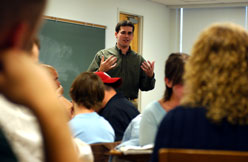 what we would call liberal arts components to their curriculum that have been lacking in the past."
what we would call liberal arts components to their curriculum that have been lacking in the past."
DePauw's distinctiveness will be further enhanced by The Janet Prindle Institute for Ethics, announced last fall. ![]() [Download Audio: "Ethics and DePauw" - 388kb] "Ethics and moral reflection have always been a part of DePauw; some would correctly state that DePauw was founded with some sort of high moral purpose in mind," President Bottoms notes. "If we read the newspapers or listen to the news these days, we know there are a lot of ethical challenges in life. And, on some reflection, we know that society somehow expects education to help improve the ethical climate in our country."
[Download Audio: "Ethics and DePauw" - 388kb] "Ethics and moral reflection have always been a part of DePauw; some would correctly state that DePauw was founded with some sort of high moral purpose in mind," President Bottoms notes. "If we read the newspapers or listen to the news these days, we know there are a lot of ethical challenges in life. And, on some reflection, we know that society somehow expects education to help improve the ethical climate in our country."
The Prindle Institute for Ethics "will develop as a place for faculty to develop their own insights into the ethical implications of current courses" and where new classes can be designed, Bottoms says. "The Institute could perhaps the sciences even more than we do now to raise for students various environmental questions, raise issues of justice across the curriculum, and have us be intentional 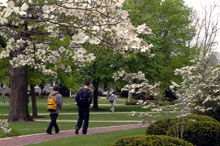 as we examine various historical and literary figures and how they have faced crises and moral dilemmas in their lives."
as we examine various historical and literary figures and how they have faced crises and moral dilemmas in their lives."
The loyalty of DePauw alumni has made of the University's improvements and successes of the past 20 years possible, Dr. Bottoms stressed to his audience, allowing for new buildings, renovations of existing structures, the aforementioned improvement in the faculty, and the scholarships that enable America's best and brightest young scholars to study at the University regardless of their financial situations.
DePauw's financial goals over the next five years, the president stated, include increasing the Annual Fund -- which collected about $4.5 million last year -- to $7 million; adding $10.5 million each year to the endowment; and to raise $80 million in deferred and planned gifts to the University. With the additional resources, "We'll be able to do the kinds of things I described" and make DePauw an even stronger institution.
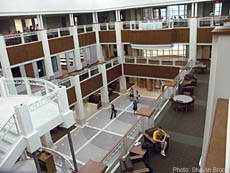 The five-year plan calls for building upon programs, on- and off-campus, that provide intellectual engagement for DePauw alumni and enhance the bonds that connect graduates to the University throughout their lives.
The five-year plan calls for building upon programs, on- and off-campus, that provide intellectual engagement for DePauw alumni and enhance the bonds that connect graduates to the University throughout their lives.
In concluding his remarks today, President Bottoms again referred to the goal of internationalizing DePauw. ![]() [Download Audio: "Success" - 476kb] "If we are successful, and I think we will be, it means we will have more people in our community who will not think like we do, who will not talk like we talk, and they will not look like we look," he said. "That is a tremendous responsibility and a tremendous opportunity for learning, and everyone on our campus will have to play a part if we are successful."
[Download Audio: "Success" - 476kb] "If we are successful, and I think we will be, it means we will have more people in our community who will not think like we do, who will not talk like we talk, and they will not look like we look," he said. "That is a tremendous responsibility and a tremendous opportunity for learning, and everyone on our campus will have to play a part if we are successful."
Access the strategic plan by clicking here.
Contact Us
Communications & Marketing

Bob Weaver
Senior Director of Communications
- bobweaver@depauw.edu
- (765) 658-4286
-
201 E. Seminary St.
Greencastle, IN 46135